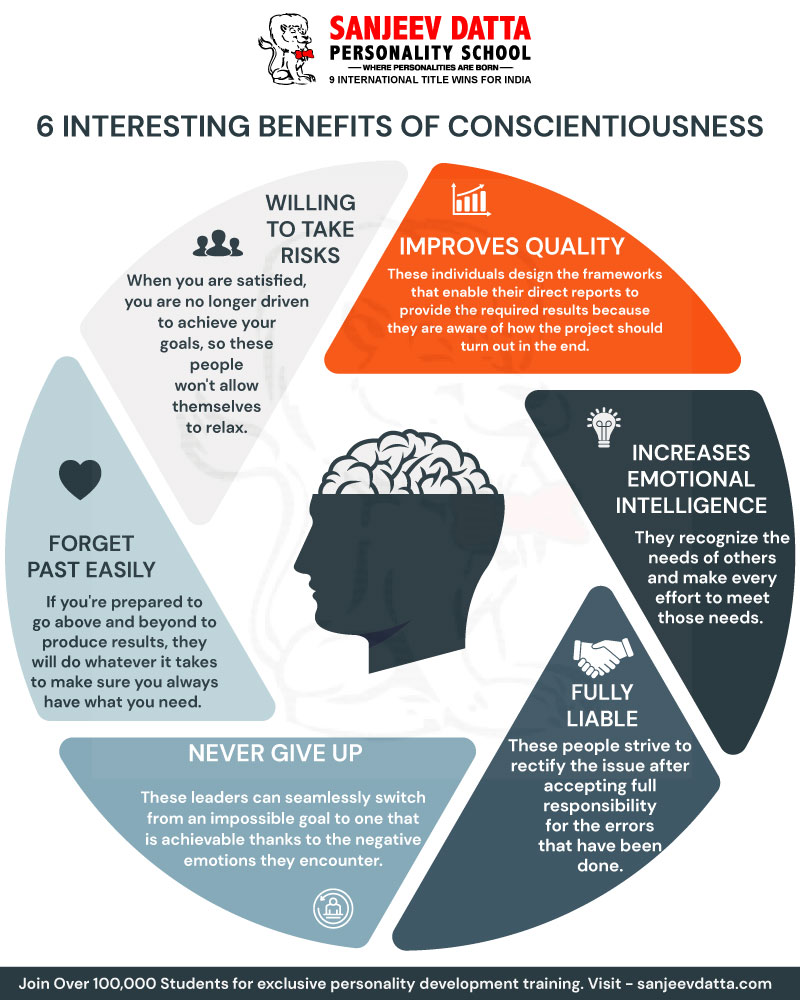Do you know what the big five personality traits are? Are you aware that companies look at these personality traits to recognize their staff? Let’s have a look!
Personality Big Five Traits:
Five unique personality traits are known as the Big Five. One of the most well-known methods for identifying and assessing individual personality variations is the Big Five model. People utilize it to better grasp who they are and how they stack up to others. Employers utilize this model to forecast how current or prospective applicants will interact with others. Additionally, it can be applied to comprehend potential employee thought processes and stress levels.
The following are the Big Five Personality Traits:
- Openness
- Conscientiousness
- Extraversion
- Agreeableness
- Neuroticism
These five personality traits have a range of two extremes. The majority of people fall somewhere in the middle of each dimension. Let’s take a closer look at this.
- Openness:

Openness is a personality trait that requires both insight and creativity. The importance of the outside world, other people, and a desire to discover and try new things are particularly strong for this personality attribute. It results in a wide range of interests and a more daring approach to making decisions.
Openness is heavily influenced by creativity, which promotes more comfort with lateral and abstract thought. Someone with a high openness trait is an individual who constantly chooses the most unusual item on the menu and pursues activities that you would never have considered. Anyone who scores poorly on this feature is likely to be perceived as having more conventional life views and may find it difficult to solve problems that are outside of their area of expertise. You can learn how to improve openness personality through a personality development course.
High Openness characteristics:
- Tend To Be Very Creative And Adventurous
- Open To Attempting New Things
- Motivated To Take On New Tasks
- Comfortable Considering Abstract Ideas
- Low Openness Characteristics:
- Hate Transformation
- Do Not Enjoy Trying New Things
- Resistant To New Ideas
- Lack Creativity
- Deny Theoretical Or Abstract Concepts
Visit: causes of negative attitude
2. Conscientiousness:

Conscientiousness is a personality attribute that comprises mindfulness, impulse control, and goal-oriented behavior. People who work in research and even high-retail finance, where attention to detail and organization are necessary as skill sets, frequently adopt this systematic approach. A person with high levels of conscientiousness often makes plans and examines their actions to determine how they influence others. Highly conscientious individuals frequently work in project management teams and HR department teams to assist balance out the structural duties within the overall team development.
Someone you know who consistently thinks ahead for your next meeting while also staying in touch and keeping a very close eye on your well-being is an excellent example of a conscientious individual. In your first meeting itself, they are focused on you and want to plan around specific dates and events. People with low conscientiousness typically hate organization and schedules, put off crucial tasks, and fail to finish assignments.
High Conscientious Characteristics:
- Spend Time Planning Appropriately
- Do Critical Things Promptly
- Pay Attention To Detail
- Prefer Following A Predetermined Routine
- Low Conscientious Characteristics:
- Dislikes Discipline And Schedules
- Leaves Things Messy And Unattended
- Forgets To Return Or Put Things Back Where They Belong
- Puts Off Doing Necessary Or Assigned Duties
- Procrastinates Crucial Jobs

3. Extraversion:

Many people will have encountered extraversion (also known as extroversion) in their own lives. It is clearly defined as “someone who gets energized in the company of others” and is universally recognized as such. This has helped to establish extroverted people as easily recognizable through many years of social contact, along with other characteristics like talkativeness, aggressiveness, and high levels of emotional expressiveness.
Everyone has at least one friend or relative who isn’t exactly a wallflower in social situations. They enjoy socializing with new people, enjoy being the center of attraction, and somehow always seem to have the largest circle of friends and acquaintances you have ever encountered. Naturally, an introvert is someone we may know in our lives who is the exact opposite. They are less energetic in social settings and prefer seclusion. Making small chats or being the center of attraction may be very stressful for them.
Extroverts frequently work in professions that need extensive public interaction, including sales, marketing, education, and politics. Extroverted persons will be more likely to lead than to stand out from the crowd and appear inactive.
High Extraversion Characteristics:
- Possesses A Large Social Network Of Friends And Acquaintances
- Enjoys Being The Center Of Attraction
- Enjoys Striking Up Discussions
- Enjoys Meeting New People
- Finds It Simple To Make New Friends
- Feels Energized With Others
- Speaks Without Thinking
Low Extraversion Characteristics:
- Prefers To Be Alone
- Feels Worn Out After Engaging In A Lot Of Socializing
- Struggles To Start Conversations
- Finds Small Talk To Be Tedious
- Carefully Consider Words Before Speaking
- Dislikes Being The Center Of Attraction
Visit: emotional intelligence in workplace
4. Agreeableness:

People with high agreeableness typically exhibit signs of loyalty, generosity, kindness, and affection. Highly agreeable people frequently exhibit strong prosocial behaviors, which indicates they are more likely to lend a hand to others. Highly agreeable personality types tend to have characteristics that lend themselves to sharing, consoling, and cooperation. Even though the term “agreeableness” doesn’t completely fit, empathy for others is sometimes seen as another type of agreeableness.
Disagreeableness is the antithesis of agreeableness; however, it takes the form of socially awkward behavioral habits. Manipulation and hostility toward others, lack of compassion or empathy, and disinterest in other people’s problems are all quite typical. You can engage with the best personality grooming trainer to increase your agreeable personality.
High agreeable people often work in fields where they can most effectively contribute. People who work in the third sector, such as those in medicine, mental health, and kitchens, score highly on the agreeableness scale.
High Agreeableness Characteristics:
- Has A Strong Interest In Other People
- Is Concerned About Other People
- Feels Empathy For Other People
- Enjoys Being Of Service To Others And Making Them Happy
- Helps Those Who Are In Need
Low Agreeableness Characteristics:
- Lacks Empathy For Others
- Unconcerned With Other People’s Feelings
- Unconcerned With Other’s Issues
- Insults And Demeans People
- Manipulate Other People
Visit: ways to read body language
5. Neuroticism:

Neuroticism is characterized by sadness, irritability, and emotional instability. Neuroticism is a physical and emotional reaction to stress and perceived threats in a person’s daily life. It is sometimes misinterpreted as antisocial behavior or as a more serious psychological problem.
High levels of neuroticism are often accompanied by anxiety, impatience, and mood fluctuations in a person. Some people who exhibit abrupt character changes may be highly neurotic and react to high amounts of stress in both their personal and professional lives. Anxiety, which is a major component of neuroticism, is concerned with a person’s capacity to handle stress and real or imagined risk. Neurotic people tend to overthink things frequently and have a hard time unwinding.
Of course, people with lower levels of neuroticism will react to stress and situations in a more steady and emotionally resilient manner. Low neurotic people are also less likely to feel sad or depressed since they take the time to concentrate on one activity rather than making mental calculations about factors that can create stress.
High Neuroticism Characteristics:
- Has A Lot Of Stress
- Worries About A Variety Of Things
- Is Easily Agitated
- Has Sudden Mood Swings
- Feels Worried And Finds It Difficult To Recover From Stressful Situations
- Low Neuroticism Characteristics:
- Is Emotionally Healthy
- Manages Stress Well
- Rarely Experiences Sadness Or Depression
- Is Very Relaxed
- Doesn’t Worry Much
Visit: importance of mental wellness
Conclusion:
Keep in mind that behavior is the result of an interplay between a person’s fundamental personality and situational conditions. Someone’s potential response depends on the circumstance in which they find themselves. People typically give answers that are in line with their underlying personality features. These features cover a wide range of personality traits. However, personality is also intricate and diverse. A person could therefore exhibit behaviors that span multiple of these personality traits.
Hope these big five personality traits help you to understand how to act in the future, at work, and in certain situations. You can even identify your new talent, challenges, and even success. Stay confident and attain success by improving these big five personality traits. Hope you enjoy reading this article!
Why Sanjeev Datta Personality School for Your Personality?
In our classes, we work on:
- CONCENTRATION DEVELOPMENT
- CHARACTER PRESENTATION
- PODIUM SPEECH TRAINING
- EXPRESSIVE ABILITY ENHANCER
- BODY LANGUAGE
- DIALECT DICTION AND VOICE MODULATION
- COMMUNICATION SKILLS
- PHONE ETIQUETTE
- SOCIAL BOLDNESS
- EXPRESSIONS AND GESTURE TRAINING FOR SCHOOL PERFORMANCES
- INTERVIEW TRAINING
- PRESENTATION TRAINING
- MEDITATION
For more details, contact us now!

